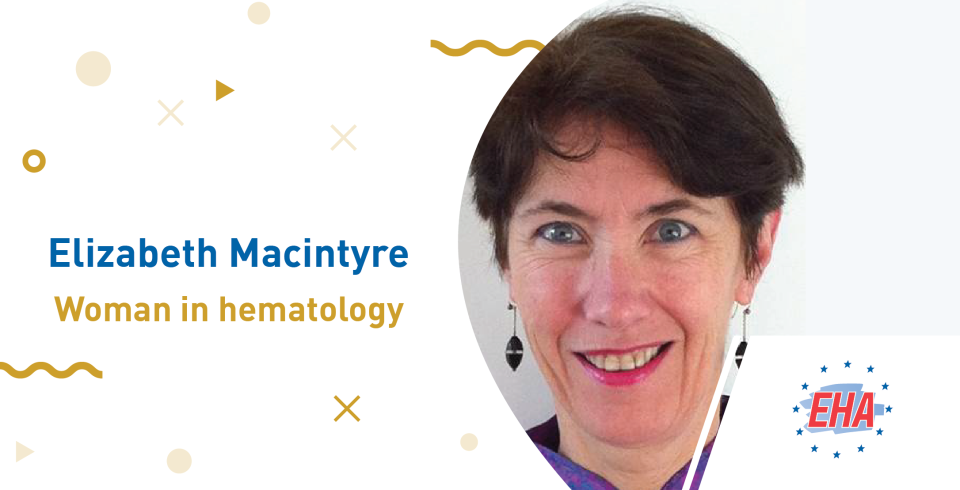This information originally appeared on the previous EHA website. Links to other pages may be inactive.

Elizabeth Macintyre is currently EHA Board Secretary. She got her MD/PhD is Britain, her PhD in France and post-doc in America. Currently, she is a Professor in diagnostic hematology in Paris Descartes (now Paris University) and Necker-Enfants Malades Hospital since 1992. She attended her first EHA congress in Brussels in 1992 and regularly since the Florence congress in 2002. She is an active volunteer in EHA committees via the (in order) Scientific Program Committee Advisory Board, Scientific Program Committee, the EHA Board, HemaSphere and HemaTopics.
In celebration of Women’s History Month and for our Volunteer of the Month, we interviewed Elizabeth about the challenges and opportunities of women in science.
EHA: What specific challenges have you faced or are you facing as a woman in science?
Elizabeth Macintyre (EM): I can only reply as a female MD/PhD, since the issues for women in pure science are somewhat different. With input to medical school now running at 70% women, a balanced gender view of medical (predominantly clinical) practice is becoming main stream for the initial strata of medical practice. This is less so for the higher echelons of the hospital hierarchy, which remain governed predominantly by a male mindset. This should evolve progressively towards a mixed approach, as long as women are allowed to bring our constructive complementarity, rather than emulating male-ness or imposing confrontational anti-maleness (to avoid the term feminist). Personally, I see this challenge in being professional AND female in such a way that men continue to learn to adapt to this mixed model as a specific challenge.
EHA: Are there advantages of being a woman in science?
EM: Undeniably. The advantages are too numerous to mention, but as some examples: We are often obliged to reduce/stop work during maternity leave, which teaches us that our work team must continue to function without us and, importantly, that we have priorities and responsibilities in life that are not just our medical/hospital role. Since the place of women in the decision-making strata of academic medicine and science is still being defined, we have the exciting and important chance to contribute to what it can or should be.
EHA: If there is something that you can change in the system (science), what would it be?
EM: The science system differs so much between European countries, it is difficult to reply, so I would start by trying to identify what works well in some EU countries and try to extend it to others. The Erasmus programs are probably one of the best recognized European success stories. I would extend this to science, while trying to minimize the bureaucratic difficulties of some of the well-meaning, but excessively complicated, current European Commission-funded proposals. If writing the scientific part of an EU proposal is difficult without professional administrative help to transform it into Eurospeak , we are losing sight of priorities in the name of political correction.
EHA: What would it take to advance the position of women in science?
EM: Helping us to have more self-esteem in our comparable value and training us to believe that we can be leaders and how to survive the boardroom battles with elegance and sang-froid. A balanced, complementary approach in commissions/boardrooms would also help women feel that we can be useful contributors, since the caricatures of the all-male-space is often not attractive to women, including very competent ones.
EHA: What would you say to the younger generation of women who are currently pursuing scientific careers?
EM: That life is all about a balance and that it’s better to try to get that balance right, at least some of the time, than to avoid balancing in favor of submission or regret.
EHA: What would you say to the girls out there who would like to pursue a career in science but are thinking twice about it?
EM: To listen to your intuition, go for what excites you, remember that there are other people to put you down if you’ve moved out of your zone of competence (so don’t do it for yourself) and “who dares wins”, even if you sometimes fail. Finally, if it’s in your destiny, it will happen, but bear in mind that we are actors in our destiny.#